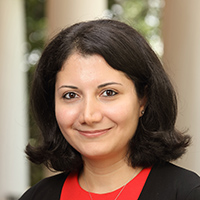 CAREER: Context-Aware Runtime Safety Assurance in Medical Human-Cyber-Physical Systems
CAREER: Context-Aware Runtime Safety Assurance in Medical Human-Cyber-Physical Systems
Bio: 
Homa Alemzadeh is an Assistant Professor in the Department of Electrical and Computer Engineering and Computer Science (by courtesy) at the University of Virginia. She is also affiliated with the UVA Link Lab, a multi-disciplinary center for research and education in Cyber-Physical Systems (CPS). Before joining UVA, she was a Research Staff Member at the IBM T. J. Watson Research Center. She received her Ph.D. in Electrical and Computer Engineering from the University of Illinois at Urbana-Champaign in 2016. Her research interests are at the intersection of computer systems dependability and data science, in particular data-driven resilience assessment and design of CPS with applications to medical devices, surgical robots, and autonomous systems. She is the recipient of the 2022 CAREER Award from the National Science Foundation and 2017 William C. Carter Ph.D. Dissertation Award in Dependability from the IEEE TC and IFIP Working Group 10.4 on Dependable Computing and Fault Tolerance. Her work on the analysis of safety incidents in robotic surgery was selected as the Maxwell Chamberlain Memorial Paper at the 50th annual meeting of the Society of Thoracic Surgeons (STS) and has been featured by the MIT Technology Review, Wall Street Journal, and BBC, among others.
Abstract:
The goal of this research is to enhance the resilience of human-in-the-loop Medical CPS by developing context-aware runtime capabilities for just-in-time detection and mitigation of safety hazards and reducing the risk of harm to patients. This project will contribute to the CPS science and engineering by bridging the gap between offline formal modeling and runtime monitoring methods and developing an integrated model and data-driven approach for design of safety engines that consider domain knowledge, human-cyber-physical context, and operator/patient profiles for predicting hazards and preventing adverse events. This year we worked on development of a formal framework for hierarchical modeling of workflows and segmentation of tasks performed by human operators in robot-assisted surgery and methods for automated inference of physical context and context to activity translation which is helpful for labeling and dataset aggregation.
 PDF document
PDF document- 5.68 MB
- 3 downloads
- Download
- PDF version
- Printer-friendly version
